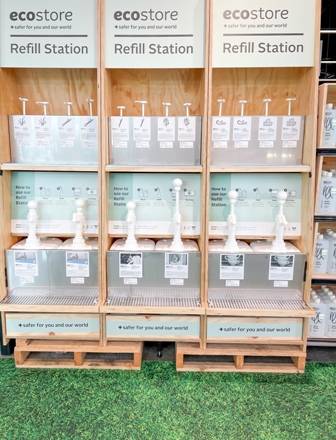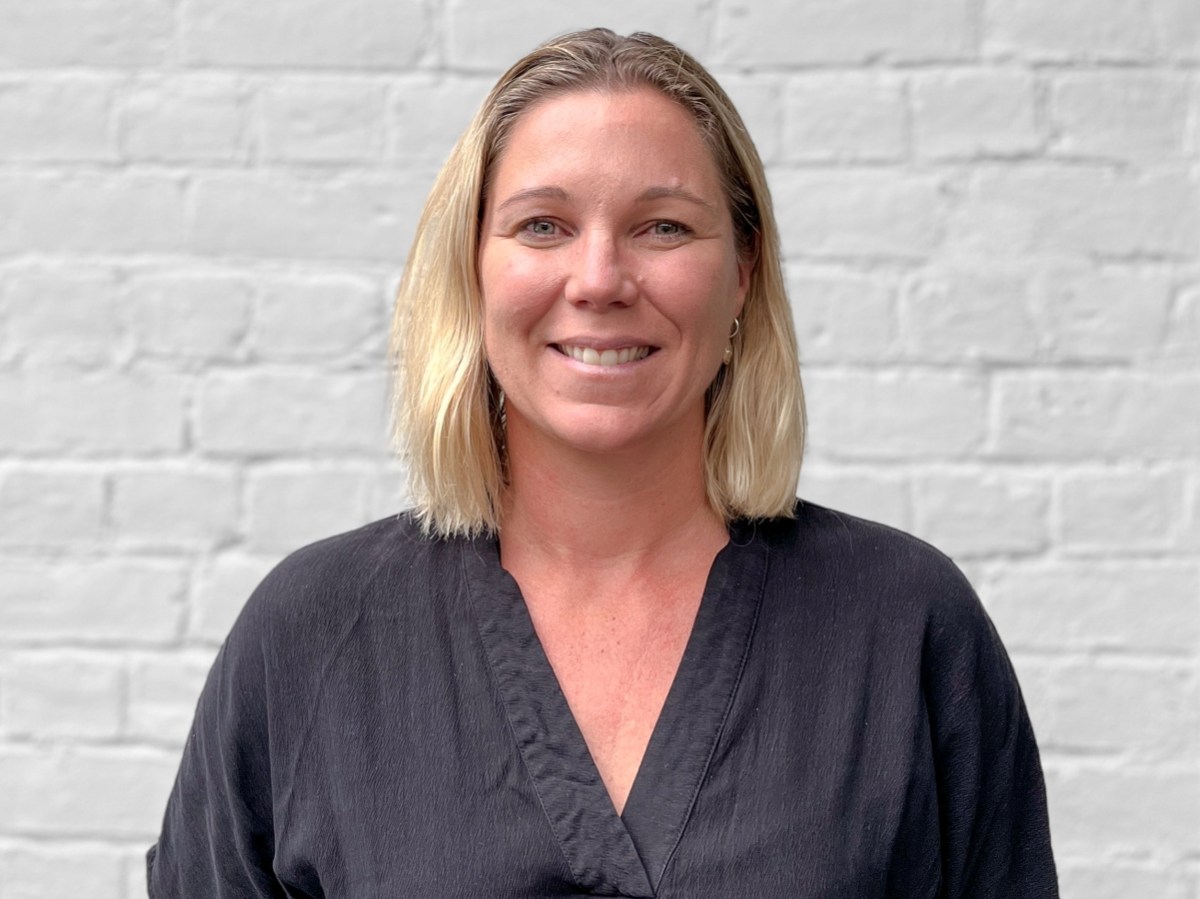The team at ecostore now have 200+ refill stations worldwide, including over 100 refill stations in New Zealand. FMCG Business caught up with Kim Tickelpenny, ecostore’s NZ Commercial Director, on leading the ‘refillution’.
You’ve been at ecostore for six years, tell us a bit about your time there, and what has been your main driver?
As commercial director, I spend my time building and maintaining our key customer relationships across NZ grocery green stores and independent retailers, as well as working to understand the requirements of customers to ensure their needs are being met. Over the last six years, we have been on a journey to make refills more accessible to customers and we’ve implemented several refill stations in supermarkets.
I genuinely want to make a difference and support people’s desire to do better and encourage them to make some small steps to help the environment. Refill stations have been a big part of my journey at ecostore, they really help people to have an impact. It’s been hugely satisfying to see the change in behaviour, people who are willing to go that extra mile to reduce their plastic.
You have led the refill market for ecostore for quite some time. What are you most proud of looking back on your career so far?
I have been hugely dedicated to getting ecostore refill stations up all around the country over the last six years – this has been no easy task! And we now have over 200 refill stations globally! I’m most proud that ecostore is helping lead the ‘refillution’ in New Zealand.

When did ecostore first start offering refill solutions to customers?
We have been offering refill solutions for over a decade in New Zealand, allowing consumers to refill their product bottles rather than buying a new bottle. We have been offering refills for more than 10 years at our flagship store in Freemans Bay, Auckland.
When was your first refill station created and where?
In 2017, we started offering refills at 50+ green stores across New Zealand, including retailers like Good For, Bin Inn, Commonsense and Huckleberry, and other organic stores and environment centres with product such as shampoo, conditioner, hand and body wash, laundry, and dishwashing liquid.
When did you get your first refill station in a supermarket?
In 2019, we launched our refill stations into selected Kiwi supermarkets. We also launched our first in-supermarket refill station in Australia. We started off launching several refill stations in Kiwi supermarkets in the South Island, and we are now expanding this offering to more supermarkets in the North Island. We recently launched refill stations at New World Pukekohe (Auckland), New World Waiuku (Auckland), and New World Rototuna (Hamilton).
We are super excited about the launch of the new ecostore refill station at New World Pukekohe, alongside the new Care Refillery. The store is beautiful, and they’ve implemented a whole range of things that give consumers easier access to more environmentally friendly options, with a lot less packaging. They are changing shopper behaviour with a new mindful and engaging shopping experience.
What other countries have ecostore refill stations?
This refill programme isn’t just available in New Zealand — it’s gone global. Today we have 200+ refill stations worldwide, with over 100 refill stations in New Zealand, and we have set up refill stations in more than 10 countries overseas. There are also a few marinas and yachts sailing around the world that have ecostore refill stations.
Do you see the refill movement growing?
The refill movement is growing globally with more and more consumers aware of products having an impact on the environment and wanting to help do something about it.
In the 2021 Kantar Better Futures report, three out of the top 10 concerns are packaging related and environmental concerns such as build-up of plastic in the environment, too much waste/rubbish generated and overpackaging, non-recyclable packaging and landfill.
New Zealanders’ personal commitment to living sustainably continues an upward trend. In New Zealand, more people are claiming to undertake circular shopping behaviour, with more people choosing environmentally friendly products that are made in New Zealand.
‘Conscious consumers’ have been early adopters of the refill concept, however with increased pressure on retailers to step up their sustainability targets, refilling as an option is growing in demand.
What are some of the great things you are seeing from other businesses in the sustainability space?
It’s great to see supermarkets embracing new supplier packaging principles that consider opportunities to remove, reduce and reuse packaging before specifying materials towards recycling and composting end of life pathways.
It was also great to see the recycling of packaging is set to increase thanks to a new partnership between the NZ Food & Grocery Council and the Australian Packaging Covenant Organisation which will advance the uptake of the Australasian Recycling Label.
What have been some of the challenges and wins with refills over the last decade?
Dealing with liquid is a challenge for us. It can be messy, and the dispensing can take time. We have been working on making changes to reduce mess and using different pumps to speed things up for the shopper experience. It’s costly, but we’re committed to constantly looking at ways to improve. It will also take time to create change in user behaviour and for consumers to remember to bring their bottle back in to refill. We have improved the user experience and it now only takes six pumps to refill the 500ml bottle and 10-12 pumps to refill the 1litre bottle.
You have led the refill growth at ecostore. What made you pursue this, and what lessons have you learned from running refill stations globally? What we’ve got is not perfect, but we continue to change, refine, and make them better. It’s a huge amount of work in terms of the infrastructure. We’re very lucky; we’ve got some very committed partners in different parts of the world, and they’re committed to what we’re trying to achieve. We will be continuing to expand the footprint of our refill stations.
People would be surprised to know that…
In the last year, through our bulk 5L and 20L size bottles and in-store refills, we sold more than 694,000 litres of product, which is enough to fill over 1.3million 500ml bottles.
So essentially the bulk bottles and in-store refills have saved 1.3million bottles that would otherwise have been produced, creating emissions, and using energy in the process.
What are the benefits of refilling?
Refills provide more value, helping people save money and reducing plastic waste. On average refill prices are on average 23% lower than the recommended retail price, and 4% lower than when the retail packs are on promotion. Each time you refill a bottle, you save a bottle from landfill or from having to be recycled. Refills are not only good for the environment and a cost saving but refilling provides a more mindful, engaging, and enjoyable shopping experience.
What do you enjoy most about being part of ecostore?
Ecostore is constantly innovating to reduce its environmental impact. Just last year we became a B Corp™ – a certification recognised globally as the highest standard for social corporate responsibility, which took more than two years to achieve! We’re not perfect, and making improvements can be challenging, but we want to continually do better, and I’m incredibly proud of what we have achieved in leading the ‘refillution’ over the last six years of working at ecostore.
What are some simple tips for people to reduce plastic throughout the year?
Anyone can start to reduce plastic. They can start out taking small steps or really challenge themselves, anything is better than nothing!
• Grab a bottle and refill your essentials again and again with your favourite ecostore liquid products: laundry, dish, hair care, hand and body wash, at more than 100 refill stations across New Zealand: Store Locator | ecostore NZ.
• Buy in bulk to reduce plastic consumption.
• If you have space, set up a ‘refill at home’ with 5-Litre containers.
• Save your non-recyclable pumps and triggers and reuse them, they last for years.
• Wash and dry your bottles and pop it in your supermarket bag to refill again next time.
• Use the same bottle to refill with the same liquid so you have the right information on your bottle, that way you know what ingredients are in your bottle.
• Find a way that suits you, there are different ways to suit everyone.



